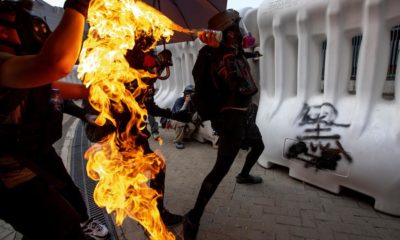World
44 killed, over 500 injured in China blasts

Beijing: At least 44 people were killed and over 500 injured in two massive explosives that ripped through a warehouse in China’s port city of Tianjin, destroying hundreds of cars, shattering window panes and with huge flames leaping into the night sky.
Twelve fire-fighters were among those killed in the blast late Wednesday at the warehouse, which stores dangerous goods, in the Binhai New Area, a news agency reported.
The first explosion occurred at 11.30 p.m. and was followed by a second more powerful blast, seconds later, BBC reported.
A total of 520 people have been hospitalized, including 66 who are critically injured, rescuers said.
Tianjin, about half an hour from Beijing by train, is home to 14.72 million people.
Zhang, who lives a 10-minute-drive from the site, said the blast made the night sky as bright as it was in the daytime, reported China Daily citing sohu.com.
A video clip of a witness showed that the heavy smoke covered the sky, and shortly after fires raged. There were loud bangs.
Truck driver Hu Xiaoliang, 32, woke up on Wednesday night due to a ear-shattering blast which threw him away from beneath his truck, where he and his co-workers were resting.
“It’s all black and smog, I can’t see anything inside. Some of my colleagues had even worse injuries,” an injured fire-fighter in his 20s told Xinhua.
Smog billowed from the site. In a nearby apartment complex, the balconies of many apartment buildings were shattered.
Du Wenjun never imagined that he would see a “mushroom cloud” outside the window of his home.
Zhao Lirong, a 35-year-old businesswoman, was asleep when the blast blew off the windows and doors of her apartment, hitting her head, her son’s neck and her husband’s feet.
Blood stains were splattered on the floors of hospitals that received injured patients.
People rushed into the streets in their pyjamas, and some worried that an earthquake could occur.
Chinese President Xi Jinping and Premier Li Keqiang have vowed to investigate the accident.
Xi ordered authorities to spare no effort to treat the injured, search for the missing and contain the fire.
Li urged authorities to intensify search and rescue operations.
Hundreds of fire-fighters struggled to contain the flames.
Around 1,000 fire-fighters and 143 fire engines were rushed to the warehouse. Xinhua reported that the volatility of the goods meant the fire is unpredictable and dangerous to approach.
At least 200 armed police officers were deployed at the warehouse.
China shut down supercomputer Tianhe-1A, which can perform 2.57 quadrillion computing operations per second, due to the blasts. Tianhe-1A is located at the National Supercomputing Center in Tianjin.
The shockwaves due to the blasts shattered windows at the centre and and led to the collapse of ceilings inside the building, according to the centre’s staff.
World
Lockdowns in China Force Urban Communities to Defy Censorship and Vent Frustration Online

Shanghai’s rich middle class is leading a wave of online dissent over the strict and prolonged lockdowns imposed in various parts of the country. Chinese internet censorship is struggling as patience is wearing thin in many urban centers, coming up with creative forms of online protests.
Social Media Posts Revealing Lockdown Tension in Shanghai
Drawn-out lockdowns are nothing new in China as authorities insist with the nation’s zero-Covid policy since the start of the pandemic. Currently over This time around, however, metropolitan areas like Shanghai are increasingly difficult to keep quiet, given that its more than 25 million residents have seen weeks of total isolation along with food shortages and many other service interruptions.
Dozens of towns and reportedly over 300 million Chinese citizens have been affected by lockdowns of different severity. As expected, urban netizens have been most outspoken over their difficulties by finding creative ways to get around state censorship and bans placed on topics, news comments and spontaneous campaigns.
Shanghai residents have been using mobile proxies and hijacking seemingly unrelated hashtags to talk about healthcare issues, delivery failures and the overall severity of their situation. The “positive energy” that the Chinese government wants to transmit during the recent prolonged series of lockdowns does not come naturally to those counting food supplies and online censors are working hard to filter words, trending topics and undesired social media sharing.
WeChat groups and message threads are under constant monitoring. Posts questioning the zero-Covid approach have been quickly deleted, including by leading Chinese health experts like Dr. Zhong Nanshan. Video footage is soon censored and protests and investigations are quickly made to disappear.
Where this has not worked, officials have exposed banners with warnings and outright threats like “watch your own mouth or face punishment”, while drones have been patrolling the city skies. Yet, if anything, this has led to further tensions and unspoken confrontation with Shanghai’s educated and affluent middle class.
Creative Online Solutions Harnessing Civic Energy
Announcements by Chinese social media that they would be publishing the IP addresses of users who “spread rumors” have not helped either. Tech industry research has shown that much of Asia’s tech-savvy population has a habit of using mobile proxies and other privacy tools, quickly finding workarounds to browse the internet freely and talk to the world about the hottest topics.
The sheer volume of forbidden posts is already a challenge for the very censorship system, experts explain. Unable to track all trending hashtags, state workers overlook topics that speak about the US, Ukraine or other popular news. Linking human rights elsewhere to their situation, Chinese online dissidents establish their informal channels and “hijack” the conversation to share personal or publicly relevant information about the Covid suppression in their town.
Sarcastic and satirical posts still dominate. Others hope to evade the censors by replacing words from famous poems or the national anthem. One thing is certain – social media, when harnessed with the right creativity, has proven its ability to mount pressure on the government in even some of the most strictly controlled tech environments like China.























